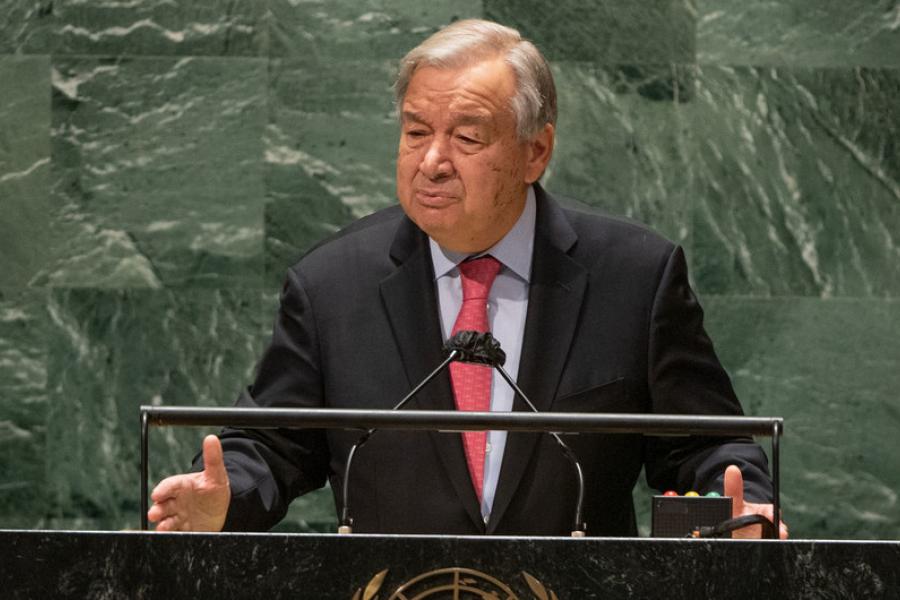Restore trust and inspire hope, UN chief says in message to UNGA76
22 septembrie 2021
- With humanity on the edge of an abyss, and moving in the wrong direction, the world must wake up, Secretary-General António Guterres said in his keynote address to the UN General Assembly on Tuesday.
Outlining six “Great Divides” that must be bridged now, he called for greater action in areas such as climate policy, gender equality and closing the gap between rich and poor.
“This is our time. A moment for transformation. An era to re-ignite multilateralism. An age of possibilities,” the Secretary-General told world leaders and ambassadors.
“Let us restore trust. Let us inspire hope. And let us start right now.”

COVID-19 ‘moral indictment’
Amid “the greatest cascade of crises in our lifetimes” - which include the COVID-19 pandemic, the climate emergency, and upheaval in places such as Afghanistan, Ethiopia and Yemen - Mr. Guterres singled out one disturbing image as indicative of the present moment, citing “the picture we have seen from some parts of the world of COVID-19 vaccines…in the garbage. Expired and unused”.
“On the one hand, we see the vaccines developed in record time - a victory of science and human ingenuity. On the other hand, we see that triumph undone by the tragedy of a lack of political will, selfishness and mistrust.”
For the Secretary-General, the fact that most wealthier countries are vaccinated, while more than 90 per cent of Africans are still awaiting their first dose, was “a moral indictment of the state of our world” and “an obscenity”.
Core values in the crosshairs
While the pandemic and the climate crisis have exposed profound fragilities, countries have shunned solidarity and are instead pursuing what Mr. Guterres described as “a dead end to destruction.”
Additionally, people are at risk of losing faith not only in their governments, but in UN values such as peace, human rights, dignity for all, equality, justice and solidarity.
“Like never before, core values are in the crosshairs,” he said. “A breakdown in trust is leading to a breakdown in values. Promises, after all, are worthless if people do not see results in their daily lives.”
Bridging the ‘Great Divides’
Stating that “now is the time to deliver”, and also to restore trust and inspire hope, the UN chief stressed that these problems can be solved. He listed six “Great Divides”, or “Grand Canyons”, that must be bridged, starting with achieving peace.
“For far too many around the world, peace and stability remain a distant dream,” he said, pointing to places such as Afghanistan, Ethiopia, Myanmar, Syria, and the Sahel region in Africa.
“We are also seeing an explosion in seizures of power by force,” he continued, adding that “military coups are back.”
Additionally, lack of international unity is another hindrance, with geopolitical divisions “undermining international cooperation and limiting the capacity of the Security Council to take the necessary decisions.”
The fact that the world’s two largest economies are at odds represents another concern, making it impossible to address “dramatic economic and development challenges.”
The Secretary-General called for cooperation, dialogue and understanding to restore trust and inspire hope among nations, and for investment in prevention, peacekeeping and peacebuilding.
‘Obligation to act’ over climate
Bridging the climate divide will require bridging trust between the North and South, he said, underscoring the need for success at the COP26 UN climate conference in Glasgow, which starts on 31 October.
Countries need to show more ambition in the key areas of mitigation, finance and adaptation, which includes committing to carbon neutrality by 2050, and providing the $100 billion annually promised a decade ago, to support developing nations.
“My message to every Member State is this: Don’t wait for others to make the first move. Do your part,” he said, urging governments to shift to the green economy through steps such as taxing carbon, ending subsidies to fossil fuels and committing to no new coal power plants.
“This is a planetary emergency. We need coalitions of solidarity - between countries that still depend heavily on coal, and countries that have the financial and technical resources to support their transition. We have the opportunity and obligation to act.”
Global vaccine plan
Ending the pandemic for everyone, everywhere, is the first step in bridging the gap between rich and poor, said Mr. Guterres. He underlined the need for a global vaccine plan to reach 70 per cent of the world’s population by mid-2022, through at least doubling present production capacity.
“We have no time to lose,” he said. “A lopsided recovery is deepening inequalities. Richer countries could reach pre-pandemic growth rates by the end of this year while the impacts may last for years in low-income countries.”
While welcoming the recent allocation by the International Monetary Fund (IMF) of $650 billion in Special Drawing Rights (SDRs), a type of foreign reserve asset, he regretted that they were mainly going to countries that need them least.
The Secretary-General advised richer economies to reallocate their surplus SDRs to countries in need, and renewed his call for debt suspension to be extended to 2022, calling it “solidarity in action.”
‘Bold steps’ for gender equality
The pandemic has also exposed and amplified the power imbalance between men and women: “the world’s most enduring injustice”, according to the UN chief.
“Bridging the gender divide is not only a matter of justice for women and girls. It’s a game-changer for humanity,” he stated.
“Women’s equality is essentially a question of power. We must urgently transform our male-dominated world and shift the balance of power, to solve the most challenging problems of our age.”
This transformation would see more women leaders in government and business, and women’s full representation everywhere. He called for “bold steps” in implementing quotas and benchmarks for gender parity.
“At the same time, we need to push back against regressive laws that institutionalize gender discrimination. Women’s rights are human rights,” he added.
“Economic recovery plans should focus on women, including through large-scale investments in the care economy. And we need an emergency plan to fight gender-based violence in every country.”
Digital technology dangers
Restoring trust and inspiring hope means bridging the digital divide, he continued, noting that half the planet still does not have access to the internet.
However, given the growing reach of digital platforms, and the use and abuse of data, the Secretary-General also pointed to the perils of digital connectivity.
“A vast library of information is being assembled about each of us. Yet we don’t even have the keys to that library. We don’t know how this information has been collected, by whom or for what purposes. But we do know our data is being used commercially - to boost corporate profits,” he said.
Mr. Guterres underlined the need for serious discussion over these and other related technological issues, such as the use of autonomous weapons, which he said must be banned.
Close the generation gap
The final bridge to mend is the generational gap with young people who will inherit the consequences of decisions made today, whether good or bad.
However, he stressed that young people need more than support, they need “a seat at the table”, which has prompted the Secretary-General to appoint a Special Envoy for Future Generations and a UN Youth Office.
Mr. Guterres cited recent research which revealed that the majority of young people in 10 countries surveyed, are suffering from high levels of anxiety and distress over the state of the planet.
Furthermore, some 60 per cent of future voters worldwide feel betrayed by their governments.
"Young people need a vision of hope for the future,” he said.
“We must prove to children and young people that despite the seriousness of the situation, the world has a plan - and governments are committed to implementing it. We need to act now to bridge the Great Divides and save humanity and the planet.”


















